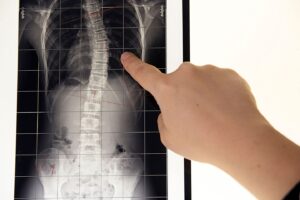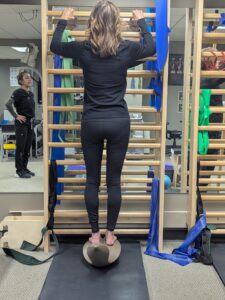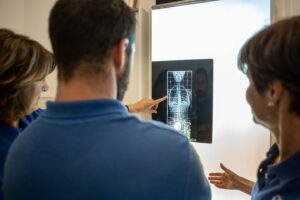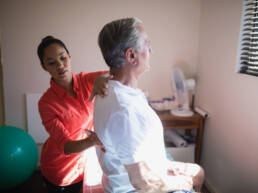Our Clinic is the leader in Evaluation and Treatment of Scoliosis in Denver, Colorado
Scoliosis is a complex condition that affects as many as 7 million people in the United States alone. The condition refers to a curvature in the spinal column. In most cases, this is a lateral curve from side to side that can occur in various parts of the spine, but this condition affects more than just the spinal column. Our integrated Scoliosis clinic is completely focused on effectively evaluate and get to reducing the patients’ Scoliosis curves.
What Is Scoliosis?
 It is important to realize that Scoliosis is not a disease, but rather a medical term that is used to describe any type of abnormal, sideways curvature of the spine. Scoliosis can refer to a spine that is shaped like the letter C, a backward letter C or the letter S.
It is important to realize that Scoliosis is not a disease, but rather a medical term that is used to describe any type of abnormal, sideways curvature of the spine. Scoliosis can refer to a spine that is shaped like the letter C, a backward letter C or the letter S.
In children, the most common type of scoliosis is idiopathic scoliosis or scoliosis with no known cause. In adults, degenerative scoliosis, or a curvature of the spine which occurs as the result of degeneration of the facet joints, is most common.
While the exact cause of idiopathic scoliosis is unknown, it is important to note that it is not caused by activities like sports, exercise, carrying or lifting heavy objects. Scoliosis also does not occur as the result of sleeping in the wrong position or minor differences in the length of the legs.
In children and young adults, the degree of scoliosis curve is known to worsen as the spine continues to grow. Degenerative, or adult-onset, scoliosis also tends to worsen over time, so early treatment is advised.
Patient Assessment
If you’re suffering from symptoms associated with Scoliosis but you’re not sure of treatment options are even the severity of your case, please fill out our complementary Patient Assessment to see what type of treatment options we would suggest to you.
Scoliosis Treatment Using The Schroth Method
 Unfortunately, there is no one magic treatment for Scoliosis. In order to successfully treat this debilitating condition, it is necessary to customize the treatment based upon the specific needs of each individual. At Denver Physical Medicine & Rehab, our team of Doctors, Physical therapists, and medical professionals specialize in the Schroth Method for scoliosis and Scientific Exercise Approach to Scoliosis (SEAS). We have been the Scoliosis specialist for Colorado and surrounding states for over 20 years. We have been effectively reducing scoliosis curves with our Scoliosis specialists and preventing surgery.
Unfortunately, there is no one magic treatment for Scoliosis. In order to successfully treat this debilitating condition, it is necessary to customize the treatment based upon the specific needs of each individual. At Denver Physical Medicine & Rehab, our team of Doctors, Physical therapists, and medical professionals specialize in the Schroth Method for scoliosis and Scientific Exercise Approach to Scoliosis (SEAS). We have been the Scoliosis specialist for Colorado and surrounding states for over 20 years. We have been effectively reducing scoliosis curves with our Scoliosis specialists and preventing surgery.
The Schroth Method for Scoliosis, is a physical therapy approach specifically designed to treat Scoliosis and Kyphosis. This is an extremely effective non-surgical option safe for all ages and has the sole purpose of returning the spine to its natural position using physical exercises. Our Schroth Certified Scoliosis Therapists will evaluate each patient personally and recommend exercises tailored to what you need specifically for your Scoliosis or Kyphoscoliosis Curves. Make no mistake, this is not a one-size-fits-all therapy. Schroth is a treatment that addresses the unique spine curvatures of each person suffering from scoliosis. We work with several Scoliosis Orthopedic doctors in the area to cumulatively treat scoliosis and for effective results. We treat a patient from the age of 6 years old and our oldest patient treated was 82 years of age. We have seen over 85,000+ scoliosis cases in our clinic.
Our dynamic approach focuses on restoring muscular symmetry and making you aware of your posture throughout the day. Not only do we help treat you in our office, we provide you with particular exercises to do at home to improve this degenerative condition. In addition to us treating scoliosis, we offer the only true custom 3D Scoliosis Brace that is geared to stabilize the progression of Scoliosis. Don’t wait another second for this to worsen. Take back your life and allow us to develop a fully customized Scoliosis treatment plan for you.
Schroth Method for Scoliosis Goals of treatment
 Patients incorporating the Schroth Method for Scoliosis into their lives can expect a few, many, or all of the following:
Patients incorporating the Schroth Method for Scoliosis into their lives can expect a few, many, or all of the following:
- Spinal stabilization and better balance via improved body mechanics
- Halt scoliosis curve progression – in adolescents we strive for a reduction in scoliosis curve
- Improve lung capacity via corrective breathing and active rib mobilization
- Relieve or reduce pain from scoliosis
- Improve strength and flexibility
- Prevent or avoid surgery
- Improve postural appearance
- Learn to maintain spinal corrections during patients’ daily activities
- Empowerment gave the knowledge and tools to manage one’s own unique scoliosis
- For Post-Surgical Scoliosis patients, the Schroth Method helps to improve posture and create stability above and below the fused spinal segments
Schroth Method for Scoliosis benefits in our Denver Clinic
Schroth Method for scoliosis in our clinic is made simpler and easier, yet still efficient and result orientated. Back-school instruction remains according to individual-curve pattern and the scoliosis-specific exercises still incorporate Schroth Method exercises.
 Patients learn self-correction according to their curvature in all sorts of daily activities (ADLs). They learn which postures are favorable and unfavorable and why.
Patients learn self-correction according to their curvature in all sorts of daily activities (ADLs). They learn which postures are favorable and unfavorable and why.- Outpatient programs with a proven track record.
- Sagittal plane exercises, exclusive to Schroth Method for Scoliosis, are validated by recent research.
- Schroth Scoliosis Method exercises are simple, powerful, effective and conveniently done at home.
- Fewer props make patient compliance for better results.
- Schroth Method is used for enhanced muscle engagement.
- Scoliosis curve specific exercises for each patient.
- Gait training incorporates curve pattern corrective movements while walking.
- Mobilizations are taught, for increased flexibility and range of motion.
- Schroth Scoliosis method exercises have been found to positively impact self-esteem.
- Schroth Method for Scoliosis is a more user-friendly program for active, integrated scoliosis management.
- Schroth method for Scoliosis treatments for scoliosis include sagittal plane exercises, activities of daily living exercises, and mobilizations are the first line of defense. They are relatively easy to learn and offer a proactive and viable alternative to the prevailing tenet of ‘watch and wait’.
Once Schroth scoliosis treatment components are learned, patients begin practicing rotational angular breathing or “Schroth breathing” with simplified exercises.
Schroth Method for Scoliosis succeeds in helping the spine shift into an over-corrected position (encouraging curve reduction) and challenging the core. Elongation and over-correction mean that more muscles (that support the trunk) are being engaged.
Frequently Asked Questions About Adult Scoliosis
Q: What is adult scoliosis?
A: Adult scoliosis is a condition characterized by an abnormal curvature of the spine that develops or is diagnosed in adulthood. It can arise from a variety of factors, including the progression of adolescent idiopathic scoliosis, degenerative changes in the spine, or conditions such as osteoporosis.
Q: What are the symptoms of adult scoliosis?
A: Common symptoms of adult scoliosis include:
- Uneven shoulders or hips
- A noticeable curve in the spine
- Back pain or discomfort
- Muscle fatigue
- Changes in posture
- Limited range of motion
Q: How is adult scoliosis diagnosed?
A: Adult scoliosis is typically diagnosed through a physical examination by a healthcare professional, who may assess your posture and spinal alignment. Imaging tests, such as X-rays, MRI, or CT scans, are often used to evaluate the degree of curvature and any underlying issues.
Q: What causes adult scoliosis?
A: Adult scoliosis can be caused by:
- The progression of adolescent idiopathic scoliosis that was undetected or untreated during childhood.
- Degenerative changes in the spine due to aging, such as arthritis or disc degeneration.
- Conditions like osteoporosis that weaken the bones.
- Neuromuscular conditions affecting muscle control and spinal alignment.
Q: Can adult scoliosis be treated non-surgically?
A: Yes, many adults with scoliosis can benefit from non-surgical treatments, including physical therapy, pain management, bracing, and exercise programs designed to improve strength and flexibility. Non-surgical approaches can help alleviate pain and improve quality of life.
Q: When is surgery recommended for adult scoliosis?
A: Surgery may be considered for adults with scoliosis when:
- The curvature is severe (typically over 50 degrees) and causing significant pain or functional impairment.
- Non-surgical treatments have not provided adequate relief.
- There are other complications, such as respiratory issues or spinal instability.
Q: What types of physical therapy are effective for adult scoliosis?
A: Effective physical therapy treatments for adult scoliosis may include:
- Strengthening exercises to support the spine and improve posture.
- Stretching and mobility exercises to enhance flexibility.
- Manual therapy to relieve pain and improve spinal alignment.
- Postural training to encourage healthy movement patterns.
Q: Can adult scoliosis worsen over time?
A: Yes, adult scoliosis can worsen over time, especially if left untreated. Regular monitoring and appropriate non-surgical interventions can help manage symptoms and slow progression.
Q: How can I manage pain associated with adult scoliosis?
Managing pain may involve:
- Physical therapy to improve strength and flexibility.
- Pain management techniques, such as heat or cold therapy, and over-the-counter medications.
- Lifestyle changes, including regular exercise, weight management, and ergonomic adjustments to workspaces.
Q: Is it possible to live a normal life with adult scoliosis?
A: Yes, many adults with scoliosis lead full and active lives. While some may experience pain or discomfort, appropriate treatment and self-care strategies can help manage symptoms and improve overall well-being.
If you are suffering from Scoliosis or Kyphosis in Colorado, don’t wait for the condition to get worse. Contact Denver Physical Medicine & Rehab today to schedule your free initial consultation with our Schroth Scoliosis Specialist. Schedule your free consultation today.
Book an Appointment Today
Please note, we do not accept Medicare or Medicaid
Located Near I-25 and S. Colorado Blvd.
1780 S Bellaire St Suite 140, Denver, CO 80222
Office Hours:
Tuesday – Friday
10 am – 6 pm
Phone: (303) 757-7280


